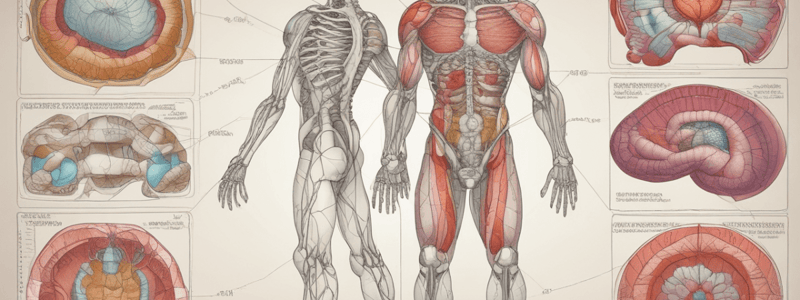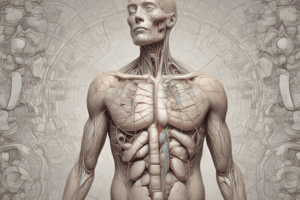Podcast
Questions and Answers
What is the function of the ACTH produced by the pituitary gland?
What is the function of the ACTH produced by the pituitary gland?
- Regulation of the thyroid hormone
- Regulation of the pineal gland
- Regulation of the parathyroid hormone
- Regulation of the adrenal cortex hormone (correct)
What is the main hormone produced by the adrenal cortex zone called glomerulosa?
What is the main hormone produced by the adrenal cortex zone called glomerulosa?
- Corticosterone
- Aldosterone (correct)
- Androgens
- Cortisol
What is the function of the pineal gland in humans?
What is the function of the pineal gland in humans?
- Regulation of the circadian rhythm
- Regulation of the thyroid gland
- Not well understood (correct)
- Regulation of the adrenal gland
Which zone of the adrenal cortex produces androgens?
Which zone of the adrenal cortex produces androgens?
What type of cells are found in the adrenal medulla?
What type of cells are found in the adrenal medulla?
What is the main function of the pinealocytes in the pineal gland?
What is the main function of the pinealocytes in the pineal gland?
What surrounds the adrenal gland?
What surrounds the adrenal gland?
What is the function of the chromaffin cells in the adrenal medulla?
What is the function of the chromaffin cells in the adrenal medulla?
What is the main characteristic of the endocrine system?
What is the main characteristic of the endocrine system?
Which of the following is NOT a part of the endocrine system?
Which of the following is NOT a part of the endocrine system?
What is the function of the hormones in the endocrine system?
What is the function of the hormones in the endocrine system?
Which part of the pituitary gland is responsible for the production of hormones such as GH and PRL?
Which part of the pituitary gland is responsible for the production of hormones such as GH and PRL?
What is the function of the parathyroid gland?
What is the function of the parathyroid gland?
Which hormone is produced by the thyroid gland?
Which hormone is produced by the thyroid gland?
What is the function of the adrenal gland?
What is the function of the adrenal gland?
Which type of cell in the pituitary gland is responsible for producing ACTH?
Which type of cell in the pituitary gland is responsible for producing ACTH?
What is the characteristic appearance of the Pars Nervosa in the pituitary gland?
What is the characteristic appearance of the Pars Nervosa in the pituitary gland?
What is the function of the parafollicular cells or C cells in the thyroid gland?
What is the function of the parafollicular cells or C cells in the thyroid gland?
What is the primary function of the principal cells or chief cells in the parathyroid gland?
What is the primary function of the principal cells or chief cells in the parathyroid gland?
What is the structure that surrounds the thyroid gland?
What is the structure that surrounds the thyroid gland?
What is the function of the oxyphiles cells or acidophilic cells in the parathyroid gland?
What is the function of the oxyphiles cells or acidophilic cells in the parathyroid gland?
What is the composition of the adrenal gland?
What is the composition of the adrenal gland?
What is the location of the Herring's bodies?
What is the location of the Herring's bodies?
What is the characteristic of the pituitary gland that surrounds colloid-filled follicles?
What is the characteristic of the pituitary gland that surrounds colloid-filled follicles?
Flashcards are hidden until you start studying
Study Notes
Endocrine System
- Characterized by parenchymal cells that release secretion products directly into the blood
- Comprises endocrine glands and groups of isolated cells in non-endocrine organs
- Regulates functions of cells in general or specific tissues or organs (target organs)
- Works with the nervous system to maintain body homeostasis
Pituitary Gland
- Divided into adenohypophysis (anterior lobe) and neurohypophysis (posterior lobe)
- Adenohypophysis:
- Pars distalis: clusters of cell cords, dense network of sinusoid capillaries, and scarce connective tissue
- 3 main types of parenchymal cells: acidophilic, basophilic, and chromophobes
- Produces growth hormone, prolactin, adrenocorticotropic hormone, gonadotropins, and thyroid-stimulating hormone
- Pars intermedia: not well-developed in humans, characterized by large, loosely stained basophilic cells that can surround colloid-filled follicles
- Neurohypophysis:
- No characteristic epithelium, fibrous and disorganized appearance
- Composed of pituicytes (neuroglia) supporting myelinated axons from the hypothalamus
- Herring's bodies: terminal dilation of axons containing oxytocin and antidiuretic hormone
Thyroid
- Two lobes interconnected by a narrow isthmus in the superior trachea
- Surrounded by a thin capsule of irregular dense connective tissue
- Composed of numerous follicles, usually filled with colloid substance
- Follicular cells: simple cubic-cylindrical epithelium lining follicles, producing thyroid hormone
- Parafollicular cells or C cells: produce calcitonin, regulating calcium concentration in the blood
Parathyroid
- Variable number of nodules, usually 4
- Dense connective tissue capsule with septa carrying vessels
- Composed of principal cells (parathyroid hormone, maintaining calcium balance) and oxyphile cells
Suprarenal (Adrenal)
- Formed by cortex and medulla
- Cortex:
- Three concentric zones: glomerulosa, fasciculata, and reticularis
- Produces aldosterone, cortisol, corticosterone, and androgens under ACTH regulation
- Medulla:
- Groups of secretory parenchymal cells densely arranged in cords surrounded by networks of capillaries
- Chromaffin cells producing adrenaline and noradrenaline as neurotransmitters
Pineal (Epiphysis)
- Projection of the roof of the diencephalon
- Connective tissue envelope (Pia Mater) with trabeculae dividing it into incomplete lobules
- Parenchyma:
- Pinealocytes in clumps or cords, producing melatonin and establishing circadian rhythm
- Interstitial cells (glia) supporting pinealocytes
Studying That Suits You
Use AI to generate personalized quizzes and flashcards to suit your learning preferences.




